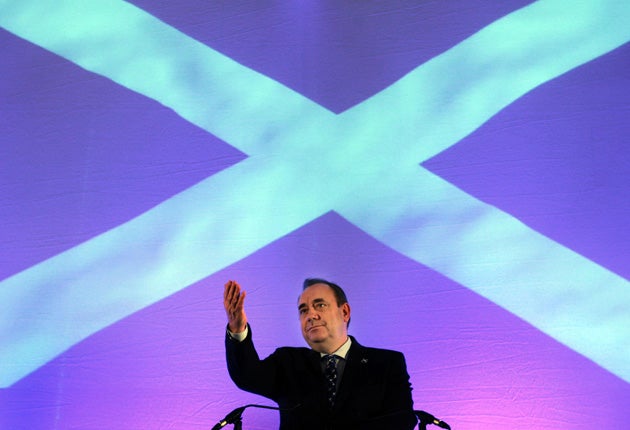SNP makes the case for Scottish independence
Salmond uses St Andrew's Day to launch campaign to break up the Union

Your support helps us to tell the story
From reproductive rights to climate change to Big Tech, The Independent is on the ground when the story is developing. Whether it's investigating the financials of Elon Musk's pro-Trump PAC or producing our latest documentary, 'The A Word', which shines a light on the American women fighting for reproductive rights, we know how important it is to parse out the facts from the messaging.
At such a critical moment in US history, we need reporters on the ground. Your donation allows us to keep sending journalists to speak to both sides of the story.
The Independent is trusted by Americans across the entire political spectrum. And unlike many other quality news outlets, we choose not to lock Americans out of our reporting and analysis with paywalls. We believe quality journalism should be available to everyone, paid for by those who can afford it.
Your support makes all the difference.Scotland's First Minister Alex Salmond set out on the road to fulfilling his lifelong political ambition yesterday by launching a White Paper that he hopes could lead to a referendum delivering full independence from Westminster possibly as early as next year.
Unveiled on St Andrew's Day against the backdrop of a Saltire, the Scottish National Party leader insisted that Scots were unwilling to tolerate the status quo any longer and that politicians who blocked their right to vote on more powers for Holyrood would pay with their seats come the next election.
"It is time for people to have their say on Scotland's future. The debate in Scottish politics is no longer between change or no change – it's about the kind of change we seek and the right of the people to choose their future in a free and fair referendum," he said.
But despite the vaunting rhetoric and patriotic setting, the occasion was strangely muted and critics were quick to point out that the 176-page document, a glossy brochure entitled Your Scotland, Your Voice, lacked important detail and showed how weak the SNP leader really was on the question.
In the face of stubbornly low support for independence – the most recent Ipsos Mori poll found only one in five backed going it alone – Mr Salmond said he was willing to negotiate over some of the key proposals.
These included the wording and number of referendum questions, when the ballot would take place and what electoral system would be used.
The main opposition parties all condemned the announcement safe in the knowledge that they would easily be able to defeat an SNP-backed referendum Bill at Holyrood. Mr Salmond has a parliamentary majority of just one over Labour and can only rely on the support of two Scottish Green Party MSPs and an independent – leaving him far short of the number he requires to make the referendum a reality.
Labour, the Conservatives and the Liberal Democrats are all strongly in favour of maintaining the Union and have thrown their weight behind the recent findings of the Calman Commission which recommends substantial extra powers for Scotland.
Labour leader Iain Gray said Mr Salmond was "out of touch" with Scots over the plans which would cost £9m. The White Paper, which follows a two-year consultation process involving 15,000 Scots, sets out four possible scenarios: no change in the current system of devolved government; more devolution as recommended by the Calman Commission; a further degree of devolution; and full independence.
Under "full devolution" – alternatively dubbed "devolution max or devolution lite" – the Scottish Parliament would be granted control over collecting the "vast majority" of revenues in Scotland – and the vast majority of spending in Scotland. The Scottish Government would also be entrusted with powers to borrow money for capital investment and infrastructure projects.
Join our commenting forum
Join thought-provoking conversations, follow other Independent readers and see their replies
Comments